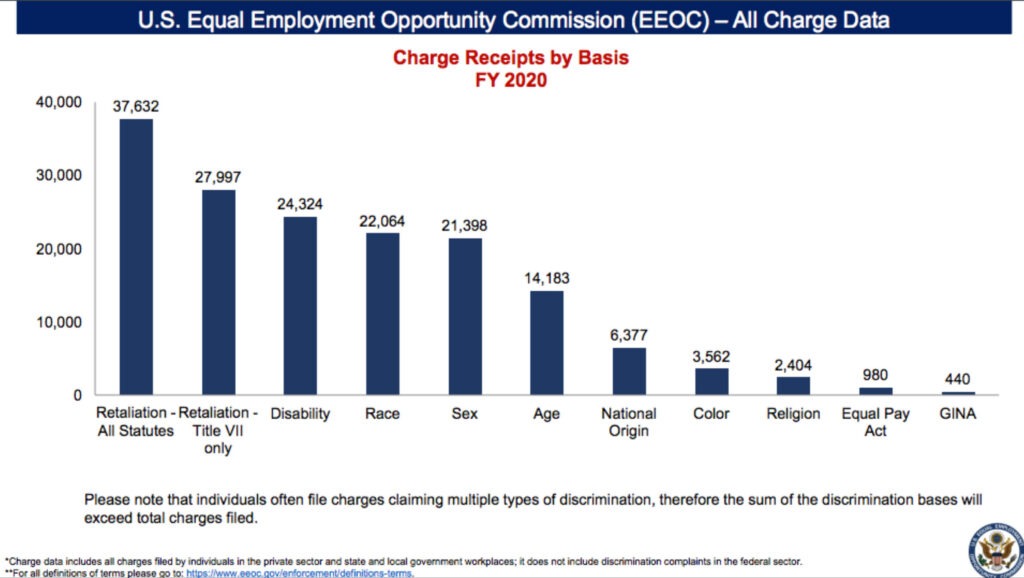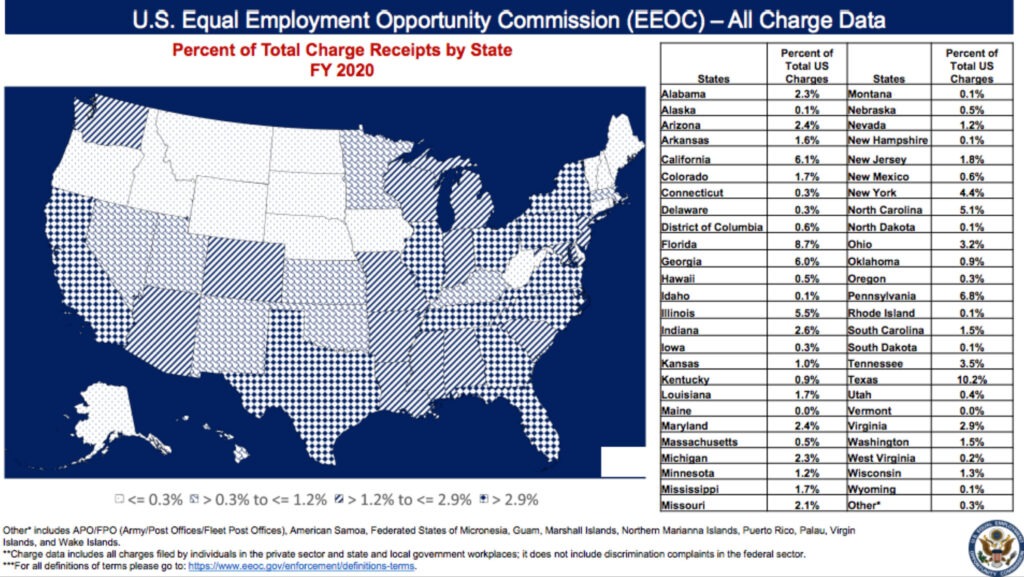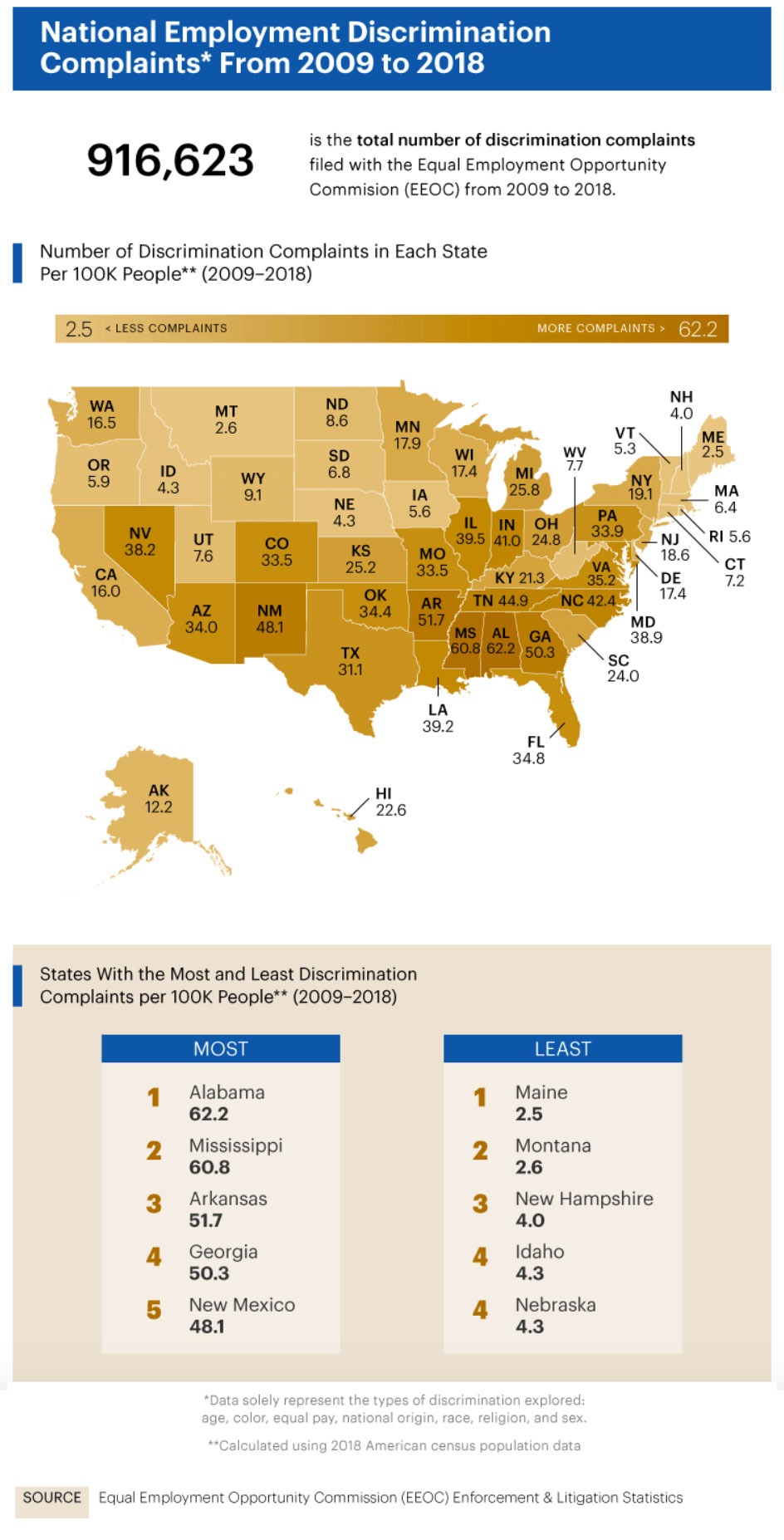Welcome to our comprehensive roundup of workplace discrimination statistics, a deep dive into the latest figures released by the United States Equal Employment Opportunity Commission (EEOC) and other reputable sources.
This report offers insights into the complex landscape of workplace discrimination in the United States, analyzing employments patterns from 2016 to 2022, and uncovering some disturbing trends that highlight the ongoing battle against various forms of discrimination.
We delve into key types of discrimination, such as race, sex, religion, age, disability, retaliation, national origin, Equal Pay Act violations, and Genetic Information Non-Discrimination Act (GINA) violations. We also investigate regional variations, exploring which states have the highest number of complaints and how different forms of discrimination dominate various parts of the country.
As we guide you through these findings, we aim to highlight not only the progress that has been made, but also the long road ahead in the fight against workplace discrimination. The data makes it clear: there is still much work to be done.
Here at Rekhi & Wolk, we’re deeply committed to this fight.
Our legal practice is focused on employment law and we’ve been standing up for workers’ rights for many years, taking on cases that range from wrongful termination to discrimination and harassment.
If you believe you’ve experienced workplace discrimination, don’t hesitate to reach out. We’re here to guide you through this process, providing expert legal advice and passionate representation.
Contact us today to learn more about your case.
Summary
Despite observing a decline in the total number of charges, an analysis by the National Law Review reveals some unsettling facts, implying that substantial strides are still required to eradicate discrimination.
Noteworthy Statistics
– A total of 61,331 charges were lodged with the EEOC in 2021.
– Almost 60% of all the discrimination charges filed in 2021 were related to Retaliation.
– Texas registered the highest number of discrimination charges, accounting for 10.2% of the total.
– From 2013, LGBTQ+ based discrimination charges have surged by over 144% annually.
– On average, Alabama had the most EEOC complaints per 100,000 residents at 62.2 (2009-2018), followed by Mississippi at 60.8 and Arkansas at 51.7.
– With only 2.5 charges per 100,000 residents, Maine reported the fewest discrimination complaints. Montana and New Hampshire had slightly higher rates at 2.6 and 4, respectively.
– From 1997 to 2018, the EEOC received a total of 1,889,631 complaints.
– Alabama led in five distinct categories of discrimination complaints including Age (5.8), Color and Race (8.3), Equal Pay (1.1), and Sex (9.7).
Overview of Workplace Discrimination Types in 2023
There are many different types of workplace discrimination. Here are the types that the EEOC tracks
How Common is Race and Color Discrimination?
Race discrimination involves treating someone unfavorably because they are of a certain race or because of personal characteristics associated with race (such as hair texture, skin color, or certain facial features). Color discrimination involves treating someone unfavorably because of skin color complexion.
This form of discrimination has seen a steady trend, with slight fluctuations, but no significant decline or rise from 2016 to 2022.
How Frequent is Sex Discrimination?
Sex discrimination occurs when an employee is treated unfavorably due to their sex or because they do not conform to traditional sex stereotypes. It includes discrimination based on gender identity and sexual orientation.
Over the years, there’s been a significant increase in these charges, particularly relating to LGBTQ+ discrimination, which has surged by over 144% since 2013.
How Often Does Religious Discrimination Occur?
Religious discrimination involves treating employees unfavorably because of their religious beliefs. The followers of traditional religions are not the only ones protected; those with sincerely held religious, ethical, or moral beliefs are also protected.
The trend in this category of discrimination has remained fairly constant between 2016 and 2022.
Is Age Discrimination Real?
Age discrimination involves treating an applicant or employee less favorably because of their age. The Age Discrimination in Employment Act (ADEA) forbids age discrimination against people who are age 40 or older.
While the total number of charges decreased, age discrimination cases are still prevalent, with an AARP study revealing that 61% of individuals aged 45 and older have experienced or witnessed it.
Does Disability Discrimination Occur Often?
Disability discrimination happens when an employer treats a qualified individual with a disability unfavorably because they have a disability. Disability discrimination also occurs when an employer treats an applicant or employee less favorably because they have a history of a disability or because the employer believes the individual has a physical or mental impairment.
The trend in disability discrimination charges has remained generally steady between 2016 and 2022.
How Frequent Does Retaliation Take Place?
Retaliation involves an employer taking adverse action against an employee for participating in legally protected activity, like filing a discrimination complaint. In 2021, nearly 60% of all EEOC charges were for retaliation, indicating a growing problem in workplaces.
Does National Origin Discrimination Occur Often?
National origin discrimination involves treating people unfavorably because they are from a particular country or part of the world, because of ethnicity or accent, or because they appear to be of a certain ethnic background. The trend in these cases remains generally constant over the period from 2016 to 2022.
What is an Equal Pay Act Violation?
The Equal Pay Act requires that men and women in the same workplace receive equal pay for equal work. Violations occur when a wage disparity exists between men and women who perform jobs that require substantially equal skill, effort, and responsibility under similar working conditions.
From 2016 to 2022, the number of charges related to Equal Pay Act Violations remained relatively stable.
What is a Genetic Information Non-Discrimination Act (GINA) Violation?
GINA protects employees or applicants from discrimination based on their genetic information. This includes information about an individual’s genetic tests and the genetic tests of an individual’s family members, as well as information about the manifestation of a disease or disorder in an individual’s family members (family medical history).
Although this category of discrimination is less common than others, it persists and remains fairly stable in terms of the number of charges filed from 2016 to 2022.
Top Five States with the Highest Discrimination Charges (As a Percentage of Total U.S. Charges)
- Texas: 10.2%
- Florida: 8.7%
- Pennsylvania: 6.8%
- California: 6.1%
- Georgia: 6.0%
Other Important Statistics
- Approximately four out of ten complaints received by the EEOC pertain to retaliation.
- An AARP study discovered that 61% of individuals (aged 45 and older) have experienced or witnessed age discrimination in their workplace.
- According to the Pew Research Center, about 42% of working women have faced discrimination in their workplace due to their gender.
- Total charges filed decreased by 26.3% from 2016 to 2020 (from 91,503 to 67,448).
- Harassment charges decreased by 14.2% from 2016 to 2020 (from 28,216 to 24,221).
- Approximately 42% of Americans have either been a victim of or witnessed racial discrimination at the workplace.
- Currently, Michigan is the only state that has enacted legislation making weight discrimination illegal.
- As of July 1, 2022, all fifty states have passed equal pay laws, with Mississippi being the last to join.
Steps Towards Progress
On July 1, 2022, Mississippi became the final state to enact an equal pay law, albeit not as comprehensive as those in other states. This signifies progress in the ongoing fight against discrimination.
Contact Us Today to Learn More About Your Case
At Rekhi & Wolk, we have been defending these rights for years. Our experienced Seattle employment attorneys understand the complexities of employment law, and we are committed to pursuing justice for our clients. We believe in a workplace that respects the dignity and worth of all its employees and does not tolerate discrimination on any basis.
If you have experienced or are currently facing discrimination in your workplace, we are here to help. Let us walk you through your options, provide expert guidance, and, if necessary, represent you in your fight for justice. Your experiences matter, and we are here to ensure that your voice is heard.
Don’t wait for change to happen. Be part of it.
Contact us today to learn more about your case and see how we can help.
References
- https://www.paychex.com/articles/human-resources/eeoc-workplace-discrimination-enforcement-and-litigation
- https://www.businessinsider.com/glassdoor-42-of-us-employees-have-witnessed-or-experienced-racism-2019-10
- https://thehighcourt.co/employment-discrimination-statistics/
- https://www.cnbc.com/2020/01/24/why-weight-discrimination-permeates-the-us-workplace.html
- https://www.cnbc.com/2020/01/24/why-weight-discrimination-permeates-the-us-workplace.html
- https://www.npr.org/sections/codeswitch/2017/03/12/516728112/-american-crime-takes-on-farming-and-illegal-immigration-with-an-unsparing-lens
- https://writersblocklive.com/blog/workplace-discrimination-statistics/#:~:text=In%202021%2C%2013%20million%20fewer,%25%20of%20working%2Dage%20males.


